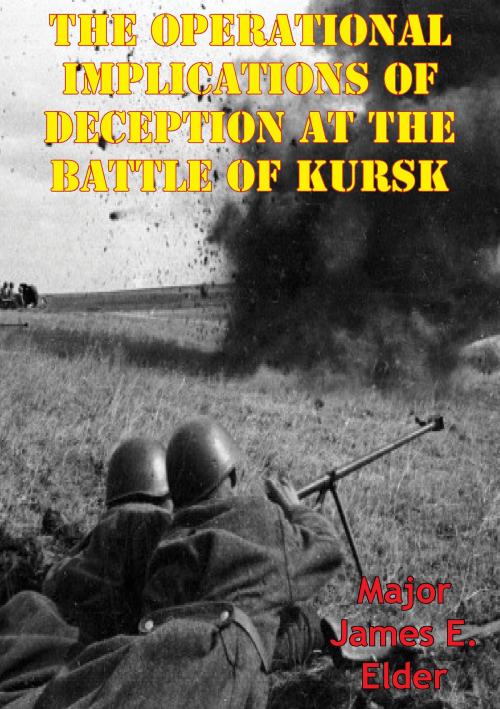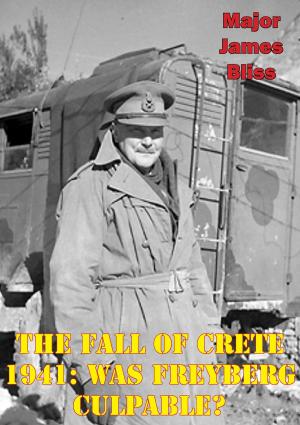The Operational Implications Of Deception At The Battle Of Kursk
Nonfiction, History, Germany, European General, Military, United States| Author: | Major James E. Elder | ISBN: | 9781786250391 |
| Publisher: | Lucknow Books | Publication: | November 6, 2015 |
| Imprint: | Lucknow Books | Language: | English |
| Author: | Major James E. Elder |
| ISBN: | 9781786250391 |
| Publisher: | Lucknow Books |
| Publication: | November 6, 2015 |
| Imprint: | Lucknow Books |
| Language: | English |
This monograph analyzes the use of deception by the Germans and Soviets in the battle of Kursk. It uses a paradigm consisting of: commander’s aim, intelligence, centralized control, synchronization and operations security to determine why Soviet deception succeeded and German deception failed. The analysis provides insights into the use of operational deception on the modern battlefield.
The conclusions of this monograph suggest that: operational deception is not a separate deception activity; that it can be used in the offense or defense; that it can be a viable combat multiplier today and that deception is an acquired Skill. The study monograph shows that operational deception must organize and control the deception efforts at the tactical level and that simple battlefield deception techniques can produce an operational effect.
The monograph shows the critical role commanders have in establishing an appropriate course of action that sets the stage for deception. The selected course of action must provide a picture of duplicity to the enemy commander by presenting two possible objectives. This concept of alternative objectives allows the deception activity to flow naturally from the COA and confuse the enemy.
The monograph recommends incorporation of deception into the officer corps professional development through professional reading programs in schools and practical application at the National Training Center. Combat Maneuver Training Center, Joint Readiness Training Center and the Battle Command Training Program. It also recommends that the Army develop and field sufficient communications and non-communications’ devices to allow Army Groups to simulate a U.S. Corps.
This monograph analyzes the use of deception by the Germans and Soviets in the battle of Kursk. It uses a paradigm consisting of: commander’s aim, intelligence, centralized control, synchronization and operations security to determine why Soviet deception succeeded and German deception failed. The analysis provides insights into the use of operational deception on the modern battlefield.
The conclusions of this monograph suggest that: operational deception is not a separate deception activity; that it can be used in the offense or defense; that it can be a viable combat multiplier today and that deception is an acquired Skill. The study monograph shows that operational deception must organize and control the deception efforts at the tactical level and that simple battlefield deception techniques can produce an operational effect.
The monograph shows the critical role commanders have in establishing an appropriate course of action that sets the stage for deception. The selected course of action must provide a picture of duplicity to the enemy commander by presenting two possible objectives. This concept of alternative objectives allows the deception activity to flow naturally from the COA and confuse the enemy.
The monograph recommends incorporation of deception into the officer corps professional development through professional reading programs in schools and practical application at the National Training Center. Combat Maneuver Training Center, Joint Readiness Training Center and the Battle Command Training Program. It also recommends that the Army develop and field sufficient communications and non-communications’ devices to allow Army Groups to simulate a U.S. Corps.


![Cover of the book Battle Of Gazala (May- June 1942) [Illustrated Edition] by Major James E. Elder](https://www.kuoky.com/images/2014/august/300x300/9781782893899-SGRM_300x.jpg)


![Cover of the book Small Unit Actions [Illustrated Edition] by Major James E. Elder](https://www.kuoky.com/images/2014/august/300x300/9781782892526-t6wt_300x.jpg)








![Cover of the book Forty Days In 1914 [Illustrated Edition] by Major James E. Elder](https://www.kuoky.com/images/2015/november/300x300/9781786255464-bLEQ_300x.jpg)
